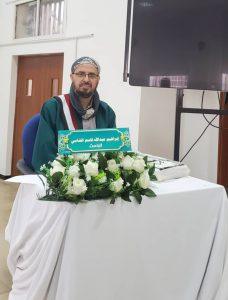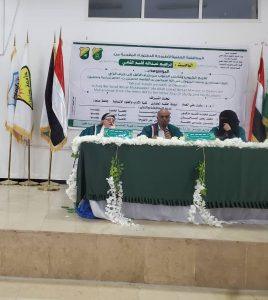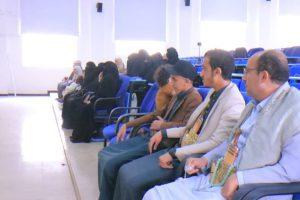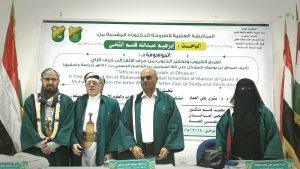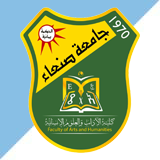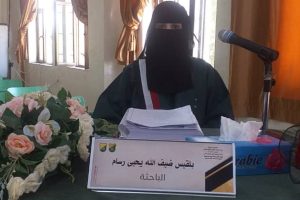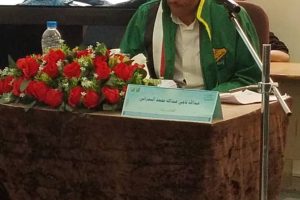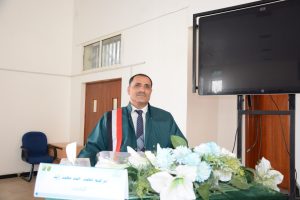Public PhD Viva-Voce Examination of Mr. Ibrahim Abdullah Qasem Al-Shami, from the Department of Islamic Studies, Faculty of Arts & Humanities – Sana’a University
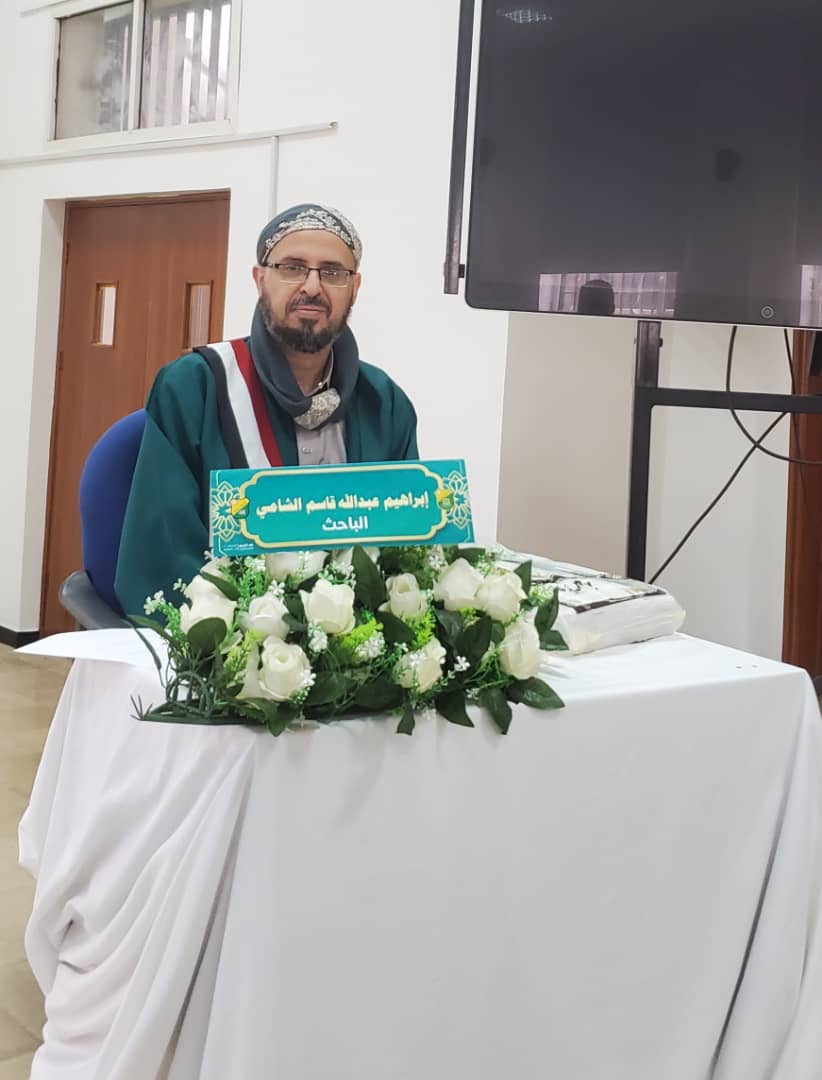
Mr. Ibrahim Abdullah Qasem Al-Shami has awarded the PhD Degree majoring in Hadith and Sciences, from the Department of Islamic Studies, Faculty of Arts & Humanities – Sana’a University. His dissertation, entitled “Tafrij al-kurub wa takfir al-Dhunub”
Is-haq ibn Yusuf ibn al-Mutawakkil ‘ala Allah Ismail ibn al-Mansur al-Qasim ibn Muhammad from the letter Alif to the letter Zay: A Study and Verification,” was defended on Tuesday, Ramadan 25, 1446 Hijri corresponding to March 25.
The Viva-Voce Committee, which was formed based on a resolution issued by the Post-Graduate Studies and Scientific Research Council, consisted of the following:
1. Prof. Ahmed Mohammed Qasem Madkour, External Examiner, Al-Hodeidah University, Chair.
2. Prof. Mohammed Yahya Al-Makhadhi, Internal Examiner, Sana’a University, Member.
3. Prof. Bushra Ali Al-Emad, Main Supervisor, Sana’a University, Member.
The primary objective of this dissertation is to conduct a comprehensive study of the author Is-haq ibn Yusuf from personal, scholarly, and religious perspectives. It also aims to verify the authenticity and content of his work, “Tafrij al-Kurub,” which elaborates on the virtues of the Commander of the Faithful, Ali ibn Abi Talib (peace be upon him), in accordance with established scientific methodologies.
The thesis presents several significant findings:
1. The manuscript is attributed to Sayyid Is-haq ibn Yusuf ibn al-Mutawakkil ‘ala Allah Ismail ibn al-Mansur al-Qasim ibn Muhammad (Died in 1173 Hijri).
2. It contains an extensive compilation of hadiths from the Prophet Muhammad (peace be upon him) regarding the virtues of Imam Ali (peace be upon him), his family, and some companions. The author has organized these hadiths alphabetically for ease of reference.
3. Historical sources indicate that this work gained considerable importance both during its time and subsequently, establishing it as a key reference within the scholarly community regarding the virtues of Imam Ali (peace be upon him).
4. At the conclusion of each hadith, the author cites the sources and hadith collections from which they were derived. This practice allows for the verification of their authenticity or identification of discrepancies, a relatively rare occurrence in such works.
5. Sayyid Is-haq led a life characterized by asceticism and was influenced by Sufi thought, dedicating himself to scholarship while remaining distanced from the political conflicts of his era.
6. Biographical accounts and historical sources affirm that he was a prominent scholar in both science and literature during his lifetime, authoring numerous works that reflect Shiite thought as well as efforts toward unity within the religious community. He also composed a significant body of poetry.
7. His intellectual development was profoundly influenced by Hadith literature and scholars. He does not categorize well-known Hadith collections, such as the Sahihs and Musnads, as exclusively Sunni but rather considers them part of the broader corpus of Islamic Prophetic Hadith literature alongside those from other theological schools. This approach reflects his intention to foster reconciliation among Hadith scholars and jurists through his scholarly contributions.
8. While Sayyid Is-haq’s doctrinal leanings are predominantly Shiite, as evident in his writings and poetry, he primarily draws from Hadith literature for jurisprudential matters.
This dissertation contributes to the field of Islamic Studies by providing valuable insights into the life and works of Is-haq ibn Yusuf, thereby enriching our understanding of Hadith sciences and their historical context.
The researcher emphasized the necessity of ongoing efforts to extract and study Yemeni manuscripts specifically, as well as Islamic manuscripts more broadly. He advocated for the encouragement of researchers in this field, highlighting the significant value of these manuscripts and the rich Yemeni and Islamic heritage they encapsulate, which offers profound knowledge, insights, and historical facts. Furthermore, he recommended enhancing access to scholarly resources, particularly manuscripts, to yield improved academic outcomes. This could be achieved through the regular publication of manuscript indexes in academic journals.
Additionally, the researcher argued against limiting research endeavors to the examination of master’s and doctoral theses, which often remain underutilized within university library collections. He proposed the organization of scientific seminars and sessions aimed at fostering knowledge dissemination and understanding within society. To facilitate this, he called for greater collaboration and coordination among Yemeni universities to promote scientific cooperation and collective research initiatives.
The Viva-Voce was attended by several academics, researchers, students, and several colleagues and family members of the researcher.
